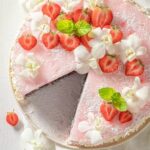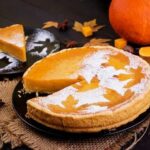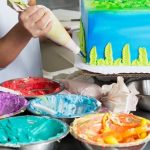Cake decorators play a vital role in turning ordinary cakes into edible works of art that bring delight and joy to people’s lives. With their precision, artistic eye, and knowledge of various techniques and materials, cake decorators are able to transform simple cake bases into stunning creations fit for any occasion. In this article, we will delve into the world of cake decoration, exploring its definition, importance, and its evolution as an art form throughout history.
Cake decoration encompasses much more than simply spreading icing on a cake. It is an intricate process that requires skill, creativity, and attention to detail. The art of cake decoration can be traced back thousands of years when ancient Egyptians first began adorning their cakes with natural decorations like fruits and nuts. Over time, cake decorating techniques have evolved and expanded to include a wide array of styles and designs.
The essential skills required of a cake decorator are vast and varied. Not only must they possess precision in baking and creating the base cake itself, but they must also have an artistic eye for incorporating color theory into their designs.
Additionally, mastering piping techniques for intricate patterns and sculpting expertise with fondant and gum paste are crucial for bringing unique creations to life. In the next section, we will further explore these essential skills that make a successful cake decorator.
The Essential Skills of a Cake Decorator
Cake decoration is an art form that requires a unique set of skills and expertise. A successful cake decorator must possess a combination of technical baking skills and artistic vision. In this section, we will delve into the essential skills required to excel in the field of cake decorating.
Precision in baking and creating the cake base is one of the fundamental skills that every cake decorator must have. The foundation of any beautifully decorated cake lies in its structure and taste. A cake decorator must be proficient in measuring ingredients accurately, following recipes diligently, and ensuring that the cakes are baked to perfection.
Having an artistic eye and knowledge of color theory is also crucial for a cake decorator. They need to understand how different colors work together harmoniously to create visually appealing designs. From choosing the right icing colors to coordinating various elements on a cake, this skill plays a significant role in bringing a creative vision to life.
Another important skill for a cake decorator is mastery of piping techniques. Piping allows decorators to add intricate designs and delicate details such as borders, flowers, and writing onto cakes. It requires steady hands, precision, and practice to achieve consistent results.
Fondant and gum paste expertise is also essential for sculpting and covering cakes with flawless finishes. Fondant is like edible clay that can be molded into various shapes and textures, while gum paste provides more flexibility for creating delicate sugar flowers and figurines. A skilled decorator knows how to handle these mediums effectively to bring their designs to life.
In summary, being a successful cake decorator requires a wide range of skills encompassing both technical abilities and creative flair. From precision in baking to mastery in piping techniques, these skills set apart exceptional decorators from the rest.
| Essential Skills | Description |
|---|---|
| Precision in Baking | Accurate measurement, following recipes, ensuring perfect bakes |
| Artistic Eye and Color Theory Knowledge | Creating visually appealing designs through color coordination |
| Mastery of Piping Techniques | Adds intricate designs and delicate details to cakes with precision |
| Fondant and Gum Paste Expertise | Sculpts and covers cakes flawlessly using these mediums |
Behind the Scenes
Preparing and Baking Delicious Cake Bases
One of the primary responsibilities of a cake decorator is to prepare and bake delicious cake bases. This involves following recipes accurately, measuring ingredients properly, and ensuring that the cakes are baked to perfection. Cake decorators must have a strong understanding of different types of cakes and their specific baking requirements. They must also have knowledge in adjusting baking times and temperatures for different cake sizes and shapes.
Mixing and Tinting Icing or Frosting
Another important task for cake decorators is to mix and tint icing or frosting. This step requires a precise hand in order to achieve the desired color consistency. Cake decorators should be skilled in creating various shades by adding food coloring gradually until the desired hue is achieved. Additionally, they must be knowledgeable about different types of icing or frosting, such as buttercream or fondant, and understand how each type behaves when mixed or tinted.
Crafting Edible Decorations
Cake decoration involves creating edible decorations that adorn the finished cakes. Cake decorators need to possess skills in crafting beautiful flowers, delicate figurines, intricate patterns, and other decorative elements using edible materials such as gum paste, fondant, or marzipan. This requires artistic ability, attention to detail, patience, and precision when working with these delicate mediums.
Assembling and Layering Cakes
Cake decorators are responsible for assembling and layering cakes to create a visually appealing end product. This involves carefully stacking multiple layers of cake with fillings or frosting in between each layer. The layers need to be leveled properly while ensuring stability throughout the cake. Cake decorators must also consider the design elements during this process to ensure that the final presentation matches their vision.
Applying Icing or Fondant Evenly for a Smooth Finish
Another crucial responsibility is the application of icing or fondant to achieve a smooth finish on the cake. Cake decorators should have a steady hand and knowledge of various techniques, such as spatula or bench scraper smoothing, to ensure an even and flawless surface. This step requires precision and attention to detail in order to create a professional-looking final product.
Completing Final Touches and Personalization
The last step in the day-to-day responsibilities of cake decorators is completing final touches and personalization. This includes adding finishing touches like borders, piping, edible pearls or studs, and any other desired decorative elements. Cake decorators must meticulously execute these details to enhance the overall design and presentation of the cake. Additionally, they often personalize cakes with writing, monograms, or specific designs requested by clients.
Overall, the behind-the-scenes work of a cake decorator involves precise baking skills, meticulous mixing and tinting of icing or frosting, crafting intricate edible decorations, layering and assembling cakes flawlessly, applying icing or fondant for smooth finishes, and completing final touches for personalization. It is through these daily responsibilities that cake decorators turn ordinary cakes into extraordinary works of edible art.
The Role of Cake Decorators in Special Occasions
Cake decorators play a crucial role in making special occasions truly memorable and delightful. Whether it’s a birthday, wedding, or holiday celebration, cake decorators have the unique ability to tailor cakes to different events and bring clients’ visions to life. In this section, we will explore the specific responsibilities and contributions of cake decorators in special occasions.
One of the primary roles of cake decorators in special occasions is collaborating with clients to understand their specific needs and preferences. Every celebration is unique, and cake decorators must be able to translate clients’ ideas into visually stunning and delicious cakes. By listening attentively and asking appropriate questions, cake decorators can create custom designs that reflect the theme, colors, and style of the occasion.
Designing custom cake toppers and personalized elements is another essential task for cake decorators in special occasions. These decorative elements are often what make a cake truly stand out. From intricate sugar flowers to fondant figurines representing beloved characters or hobbies, these personalized touches add an extra layer of meaning and sentimentality to the celebration.
In addition to working closely with clients, cake decorators must also adapt their skills to different themes and styles. Each occasion may require a unique design approach-whether it’s a rustic-themed wedding or a whimsical children’s birthday party. Cake decorators need to have a wide repertoire of techniques at their disposal so that they can create cakes that fit seamlessly into any event.
| Type of Occasion | Percentage of People Who Opt for Custom Cakes |
|---|---|
| Weddings | 87% |
| Birthday Parties | 72% |
| Holidays | 64% |
These statistics demonstrate the significant demand for custom cakes in special occasions, emphasizing the crucial role that cake decorators play in creating these one-of-a-kind confections. By combining their artistic skills, technical expertise, and collaboration with clients, cake decorators bring joy and beauty to celebratory moments.
Exploring Different Cake Decoration Techniques
Cake decorators use a variety of techniques to create beautiful and intricate designs on their cakes. These techniques not only add visual appeal, but also enhance the taste and overall experience of the cake. In this section, we will explore some of the different cake decoration techniques that cake decorators use to bring their creations to life.
One popular technique is buttercream piping. This involves using a pastry bag and various tips to pipe buttercream icing onto the cake in different shapes and patterns. With this technique, decorators can create delicate floral designs, elegant borders, or even personalized messages. The versatility of buttercream piping allows for endless possibilities in terms of design.
Another technique commonly used by cake decorators is royal icing decoration. Royal icing is a smooth, hard icing that dries to a crisp finish. It is perfect for creating intricate lace-like patterns, filigrees, or delicate details on cakes. Cake decorators often use special tips and piping bags to achieve these detailed designs with royal icing.
Rolled fondant and gum paste are also popular among cake decorators. Fondant is a pliable icing that can be rolled out and draped over cakes for a smooth finish. It allows for clean lines and sharp edges, making it ideal for sculpting three-dimensional decorations or covering cakes entirely.
Gum paste, on the other hand, is a sugar-based dough that can be molded into various shapes and figures. Both fondant and gum paste provide decorators with endless possibilities in terms of design and creativity.
Additionally, cake decorators may incorporate airbrushing and food coloring techniques into their work. Airbrushing involves using an airbrush tool to apply color gradients or create unique effects on the surface of the cake. Food coloring techniques include methods like marbling, blending colors together, or painting intricate details onto the cake.
Lastly, stenciling and embossing are techniques used by cake decorators to add texture and patterns to their designs. Stenciling involves placing a stencil onto the cake and using an edible spray or dust to create a pattern or design. Embossing, on the other hand, involves pressing a textured mat or roller onto fondant or gum paste to create raised patterns.
Overall, cake decorators have a wide range of techniques at their disposal to create stunning and unique designs. Whether it’s using buttercream piping, royal icing decoration, rolled fondant and gum paste, airbrushing and food coloring techniques, or stenciling and embossing, these techniques allow cake decorators to showcase their artistry and creativity while delighting customers with visually appealing and delicious cakes.
The Importance of Creativity and Innovation in Cake Decoration
Creativity and innovation play a vital role in the world of cake decoration. Cake decorators are constantly pushing boundaries and thinking outside the box to create unique and stunning designs that captivate the eyes and taste buds of their clients. In this section, we will explore the importance of creativity and innovation in cake decoration, as well as the ways in which decorators stay up-to-date with emerging trends and techniques.
One of the key aspects of cake decoration is staying current with the latest trends. As styles and preferences evolve, cake decorators need to adapt their designs to meet the changing demands of their clientele. By staying aware of industry trends, decorators can offer fresh and modern designs that appeal to a wide range of customers. This may involve incorporating new tools, materials, and techniques into their work.
In addition to following trends, cake decorators also strive to innovate within the field by coming up with new ideas and techniques. They are constantly experimenting with different design elements, flavors, textures, and presentation styles to create cakes that are truly one-of-a-kind. Whether it’s inventing a new piping technique or using unconventional materials for decorations, creativity and innovation allow cake decorators to push the boundaries of what is possible in cake design.
To nurture their creativity and continue honing their skills, many cake decorators participate in workshops, seminars, and other educational opportunities. These events provide a platform for industry professionals to share their knowledge and insights while encouraging attendees to explore new ideas. By learning from others in the field or attending classes on specific techniques or styles, decorators can expand their creative toolkits and bring fresh ideas back into their own work.
Challenges Faced by Cake Decorators
Time management and meeting deadlines
One of the challenges that cake decorators often face is managing their time effectively and meeting strict deadlines. Creating a beautifully decorated cake requires careful planning and execution, as well as adherence to a timeline. Cake decorators must consider factors such as baking and cooling time, decorating techniques, and any additional customizations requested by the client. It is essential for cake decorators to be able to work efficiently while still maintaining high-quality craftsmanship in order to meet these deadlines.
Handling allergies and dietary restrictions
In today’s world, many individuals have specific dietary needs or restrictions due to allergies, intolerances, or personal preferences. Cake decorators must be equipped with the knowledge and skills necessary to accommodate these special requirements in their creations.
This includes understanding alternative ingredients that can be used to replace common allergens such as nuts or dairy products. Additionally, cake decorators should also have the ability to communicate clearly with clients about their dietary needs and offer suitable alternatives that are safe for consumption.
Delivering cakes safely and intact
Another challenge faced by cake decorators is ensuring that the finished product reaches its destination in perfect condition. Cakes are delicate and prone to damage during transportation, especially if they have intricate designs or fragile decorations. Cake decorators must carefully package their creations using appropriate materials and techniques to prevent any mishaps during delivery.
This may involve using supports within the cake layers or securing decorative elements properly so that they remain intact throughout transit. The ability to safely transport a cake without compromising the design is crucial for professional cake decorators.
Managing client expectations and ensuring satisfaction
Cake decorators often work closely with clients who have specific ideas or visions for their cakes. Balancing the client’s expectations with practical considerations can sometimes be challenging.
It is important for cake decorators to effectively communicate with their clients throughout the process, from initial consultation to delivery, in order to fully understand their desires and provide suggestions or modifications when necessary. By managing client expectations and ensuring their satisfaction, cake decorators can establish strong relationships with their clients and build a reputation for delivering exceptional creations.
Becoming a Cake Decorator
To pursue a career as a professional cake decorator, obtaining the necessary education and professional development is essential. While some individuals may have natural talent in cake decorating, it is important to gain formal training to refine skills and enhance creativity. There are various paths one can take to become a cake decorator, depending on their goals and aspirations.
One option for aspiring cake decorators is to enroll in culinary school programs that offer specialized courses in baking and pastry arts. These programs provide a comprehensive curriculum that covers everything from basic baking techniques to advanced cake decorating skills. Through hands-on training and guidance from experienced instructors, students can learn the fundamentals of cake decoration and develop their artistic abilities.
Aside from culinary schools, apprenticeships and internships are another valuable avenue for professional development in cake decoration. Working under the guidance of experienced cake decorators allows aspiring decorators to gain practical knowledge, expand their skill set, and understand the nuances of running a successful business. This firsthand experience provides invaluable insights into the industry and can open doors to future job opportunities or even entrepreneurship.
Continuing education is also crucial for staying current with emerging trends and techniques in the world of cake decorating. Workshops and seminars conducted by industry experts offer opportunities for learning new skills, mastering advanced techniques, and experimenting with innovative designs. These sessions also provide platforms for networking with other professionals in the field, sharing ideas, and gaining inspiration.
Finally, building a portfolio is an essential aspect of becoming a successful cake decorator. A portfolio serves as a visual representation of one’s skills and expertise, showcasing past projects and demonstrating versatility across different styles and themes. Aspiring decorators can start by taking on small freelance projects or even creating cakes for friends’ events in order to build up their portfolio.
Conclusion
In conclusion, cake decoration is not only a skill but also an art form that requires a diverse set of talents and knowledge. From precision in baking to mastering the intricate piping techniques, cake decorators must possess a range of skills to create stunning and personalized cakes. Through their day-to-day responsibilities, cake decorators devote their time to crafting delicious cake bases, mixing and tinting icing or frosting, and assembling layered cakes with precision.
Cake decorators play an essential role in making special occasions unforgettable. With their ability to tailor cakes to different celebrations such as birthdays, weddings, and holidays, they bring joy and happiness to clients by collaborating with them to bring their vision to life. Moreover, cake decorators have the unique ability to design custom cake toppers and add personalized elements that make each creation truly one-of-a-kind.
Creativity and innovation are at the core of the artistry of cake decoration. Cake decorators are constantly pushing boundaries and staying up-to-date with emerging trends and techniques. They incorporate new tools and materials into their creations, balancing traditional styles with modern approaches to cater to diverse clienteles’ preferences.
Despite the challenges faced by cake decorators such as managing time constraints, handling allergies, delivering cakes safely, and managing client expectations, they continue to rise above these hurdles with passion and dedication. The journey towards becoming a professional cake decorator involves education through culinary school programs, specialized courses, apprenticeships, internships as well as continuing education through workshops and seminars.
Frequently Asked Questions
What is the responsibility for cake decorator?
The responsibility of a cake decorator is to create visually appealing and delicious cakes for various occasions. They are entrusted with the task of transforming plain baked cakes into works of art by applying decorative techniques such as piping, sculpting, and fondant work.
Cake decorators are responsible for understanding and implementing design briefs provided by clients or supervisors, which may include themes, colors, or specific decorations requested. Additionally, they must ensure that all ingredients used are fresh and of high quality, while also adhering to food safety and hygiene standards.
What skills does a cake decorator need?
A cake decorator needs a combination of artistic skills and technical knowledge to excel in their role. Firstly, they must possess a strong eye for detail and creativity to bring ideas to life on cakes. This involves having an understanding of color theory, composition, and design principles to create visually pleasing arrangements.
Secondly, cake decorators need good manual dexterity and hand-eye coordination to handle delicate tools and create intricate designs. They should be skilled in handling icing bags, spatulas, sculpting tools, and other equipment necessary for their craft. Lastly, having knowledge of different baking techniques, flavor combinations, and current cake decorating trends can significantly enhance a decorator’s skill set.
What do cake decorators do everyday?
Cake decorators engage in various tasks on a daily basis depending on the nature of their work environment. They typically start by preparing cake bases through leveling or carving if necessary before applying icings like buttercream or fondant as a foundation for decorations. Decorators then use specialized techniques like piping swirls or borders using different tips to achieve desired patterns or images on the cakes’ surface.
Creative details can be added through modeling flowers or other edible figurines using gum paste or marzipan. Throughout the day, decorators may also interact with clients regarding custom orders or provide recommendations based on their expertise. Cleaning up workstations after completing projects is essential for maintaining hygiene standards in the workspace as well.

Welcome to my blog about home and family. This blog is a place where I will share my thoughts, ideas, and experiences related to these important topics. I am a stay-at-home mom with two young children. I hope you enjoy reading it! and may find some helpful tips and ideas that will make your home and family life even better!





